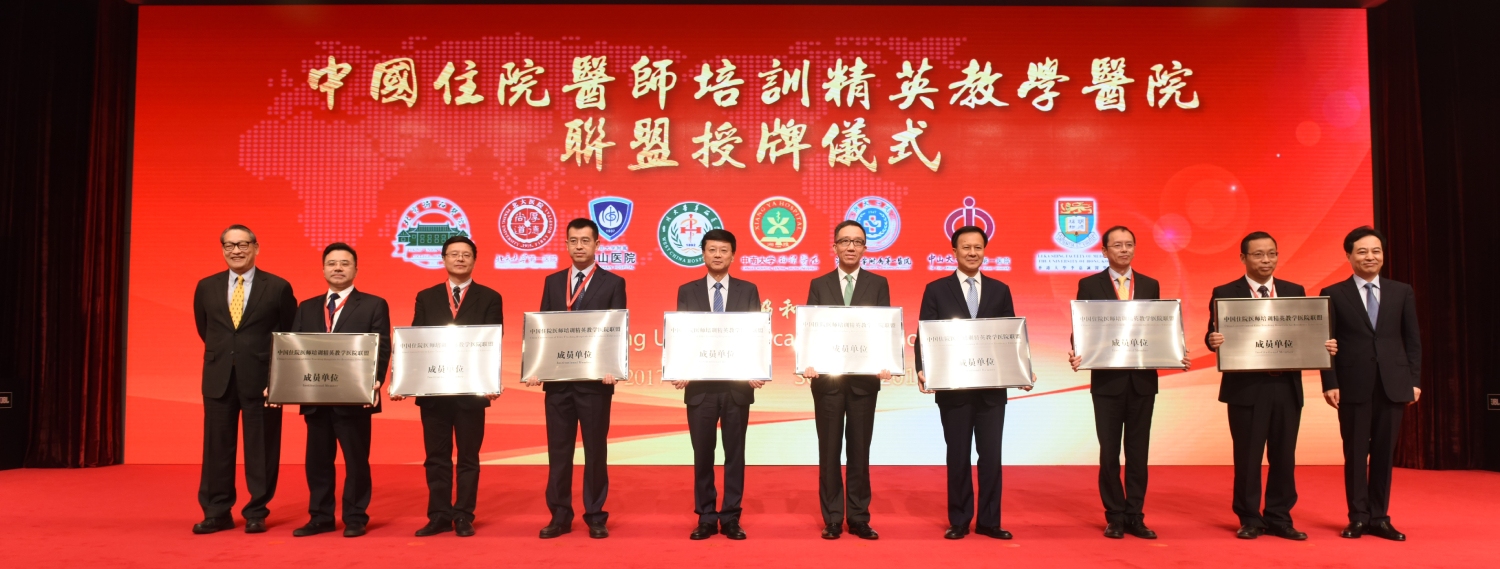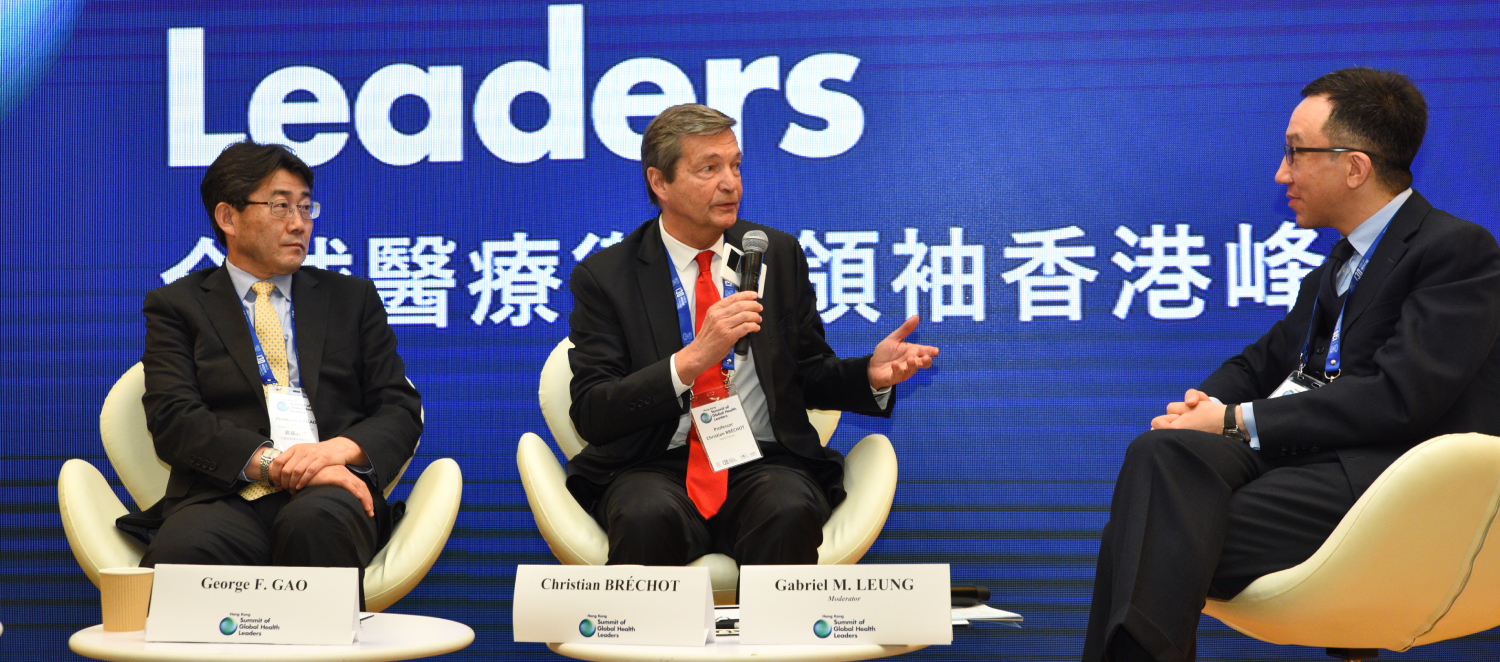The Faculty aspires to be a global leader in teaching and learning, research and discovery, clinical service and knowledge exchange in the professional domains of medicine, nursing, public health, pharmacy, Chinese medicine and in the biomedical and social sciences that underpin these professions. At the same time, we aim to nurture outstanding students who would go on to serve the people locally, nationally and around the world, thus leading to sustainable social development through better health.
The Faculty endeavours to:
- provide quality, student-centred learning opportunities that develop the intellectual and personal attributes of students to the fullest possible extent, thus enabling them to become competent practitioners and lifelong learners with professionalism, integrity and leadership qualities;
- engage in innovative and impactful research at the frontiers of knowledge, from the cellular to the population levels and with a particular emphasis on translational science;
- deliver superlative clinical service and provide robust clinical governance in all settings that we serve;
- partner with all relevant professional groups, government, civil society organisations and the public at large to protect and promote health and to enhance the provision of health care; and
- become a national, regional and global hub of excellence in the core functions of teaching and learning, research and discovery, clinical service and knowledge exchange.
National Engagement
The China Consortium of Elite Teaching Hospitals
HKUMed was officially invited to join the China Consortium of Elite Teaching Hospitals in 2017. Together with the nine other top teaching hospitals in the nation, HKUMed works to foster exchange and cooperation in Hong Kong and the Chinese Mainland in the field of resident doctor training.
HKUMed's position as one of 10 members of the China Consortium of Elite Teaching Hospitals allows us to play to the established strengths of Hong Kong, China as a bridge between the West and the Chinese Mainland. On the 40th anniversary of China's "reform and opening up", Hong Kong, China, was formally acknowledged to have played a leading role, as we continue to lead from the front in the health and education sectors.
HKUMed is both a keen participant and a leader in the national health-sector reform movement, a role for which the Faculty has already achieved recognition. In alignment with President Xi Jinping's vision of Healthy China 2030, HKUMed has continued its work to rapidly improve the health of all sectors of society, primarily through our work in educating and training healthcare professionals.
The Faculty's valuable experience in the fields of education and training is being shared through the Consortium with the 9 other top teaching hospitals in the country to support the healthcare reform drive. One of the main purposes of the Consortium is to set standards, define competencies and serve as a national role model of residency education. HKUMed possesses particular expertise in these areas through its experience of implementing a local training system since 1992 (overseen by the Hong Kong Academy of Medicine, whose founding President was the late Professor Sir David Todd).
The Elite Consortium has also been a vehicle for higher-level exchanges and engagement, such as the Peking Union Medical College Hospital's International Conference on Residency Education in 2018, at which the Consortium Consensus on Core Competency Framework for Residency Education was released. All members collaborated toward achieving goals in six key areas: professional accomplishments, medical knowledge and expertise, care for patients, communications and co-ordination, teaching capacity and lifelong learning.
The China Nursing Consortium of Elite Teaching Hospitals
The HKU School of Nursing has also been invited to join the China Nursing Consortium of Elite Teaching Hospitals (the Nursing Consortium) in 2019. The invitation opens the way for the School to collaborate with eight other prominent hospitals/nursing departments in the Nursing Consortium to facilitate cooperation and exchange experiences in clinical nursing education and training.
The School is the only nursing institution in Hong Kong named as a member of the Consortium, allowing it to play a leading role in modernising nursing residency education in the Chinese Mainland. By leveraging the Consortium and strengthened collaborations with various hospitals and nursing departments in the nation, the School will enhance training for nurses and nurse specialists, exchange best clinical practices, engage in research on policy and management, share resources on clinical nursing education, and establish of standards to sharpen competencies of nursing professionals in the Chinese Mainland.
The School will actively engage in the Nursing Consortium, in particular, by providing internationally benchmarked training on advanced nursing practices through its taught Master and Doctor of Nursing programmes, and by providing a platform for research collaboration and big data generation to improve nursing care decision-making.

Global Engagement
We pride ourselves on our international community of students and staff, who are essential to our vibrant, colourful campus life, with over 100 countries represented in the HKU student body.
The Faculty's strategic direction places heavy emphasis on collaborative research efforts; Faculties and departments are not silos, they are an inextricable part of the University community, just as universities are a part of the wider community and international fields of knowledge. Regionally and internationally we also pride ourselves on our collaborative research agreements, public-private partnerships, world-class seminars and symposia, community workshops, and public outreach.
The level of activity in all areas, including teaching, research and clinical activity, is only expected to intensify in the coming years. As we share expertise and contribute to the greatest healthcare reform in human history – one that is improving the lives of more than one billion people – we also aspire to build mutually rewarding relationships with all parties involved.


Follow HKUMed